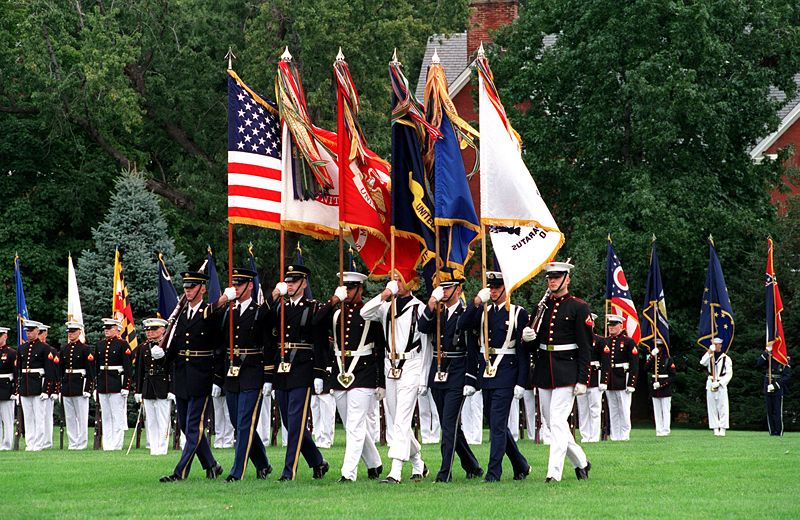"Hard Choices" Under Discussion at CNAS
The Iraq/nation-building/COIN true believers have some influence. But their ranks are small—and shrinking.
 Last week, I attended the launch of the new report from the Center for a New American Security, "Hard Choices: Responsible Defense in an Age of Austerity." The event at the Newseum (one of the better views in town) featured report authors David Barno, Nora Bensahel and Travis Sharp, with additional comments by Tom Donnelly of the American Enterprise Institute and the Stimson Center's Gordon Adams.
Last week, I attended the launch of the new report from the Center for a New American Security, "Hard Choices: Responsible Defense in an Age of Austerity." The event at the Newseum (one of the better views in town) featured report authors David Barno, Nora Bensahel and Travis Sharp, with additional comments by Tom Donnelly of the American Enterprise Institute and the Stimson Center's Gordon Adams.
I haven't yet read the entire report, and I'm sure that I'll have more to say. But a few things from the meeting stuck out for me:
1. CNAS President John Nagl kicked off the proceedings by remembering the sacrifice of U.S. troops and their families over the past ten years of war. The gesture seemed particularly appropriate on the ten-year anniversary of the start of the Afghan war. Even more striking, however, was the fact that no one else talked at any length about Afghanistan, or Iraq, for the remainder of the ninety-minute session. There was some mention of the challenge of reducing military spending while the wars were still ongoing. For example, the authors went out of their way to point out, both in the report and in the session today, that reforming military pay and benefits is a political nonstarter—especially with troops still regularly in harm's way. But Gordon Adams concluded that the little attention paid to Iraq and Afghanistan in the discussion and the report signaled something very significant: Americans are anxious to get out of the COIN/nation-building/post-conflict reconstruction business, and Washington is finally paying attention. It is highly unlikely that the U.S. government will attempt an Iraq-style operation in the near future, and that is a good thing.
2. Travis Sharp emphasized the need to get away from the "golden ratio"—the informal deal that awards each of the services a roughly equal share of the total Pentagon pie—30 percent to the army, 30 percent to the navy (and Marine Corps), and 30 percent to the air force—with the remaining 10 percent shared defense-wide. Sharp noted that the golden ratio isn't exactly, well, golden. The shares have fluctuated a bit from time to time. The army's share rose during Korea and Vietnam and after 9/11. The navy fared relatively well in the 1970s and 1980s. The air force's heyday was in the 1950s and 1960s. Despite these fluctations, however, the service shares have remained quite stable.
That should change. Going forward, Sharp stressed the need to actually prioritize between the services, not to simply give every service a haircut. The priority in the report reflects Gordon Adams's point above: if we are getting out of Iraq-style nation-building missions, then the army will shrink, in real terms (it will get smaller), but especially in terms of its share of the budget relative to the navy and air force. (Ben Friedman predicted that this might happen here.)
3. Which relates to the the third and final point: Can we choose? Can we do strategy, which implies weighing costs and benefits, and prioritizing ends, ways and means? Or are we not doomed/compelled to send our troops hither and yon? Tom Donnelly says that foreign wars will happen, and that we can't avoid becoming involved. Our behavior won't change, even if the resources we provide to our military do. According to Donnelly, it is better to prepare for the eventuality of U.S. military involvement abroad and maintain a standing military capable of waging war anywhere, at any time.
Gordon Adams cried foul. These wars, but especially the war in Iraq, he explained, are wars of choice. We could refuse to intervene in certain conflicts, and we are likely to do so in the future. We have, in our history, occasionally chosen to initiate wars, but we quickly learn that such missions are costly; they unleash a host of new challenges, and they are rarely justified after the fact. Most Americans believe that about Iraq. They doubt that the benefits of that war will ever outweigh the costs. A growing number feel that way about Afghanistan. Donnelly is one of the true believers. He would still choose to launch a war to topple Saddam Hussein in 2003, even knowing what he knows now. And he likewise supports the open-ended nation-building mission in Afghanistan that we have been conducting over the past three years, not the narrowly focused operation launched ten years ago today.
The Iraq/nation-building/COIN true believers have some influence. Mitt Romney counts a number of them as his foreign-policy advisers. But their ranks are small, and shrinking. And it is signficant that we can no longer reliably count CNAS among them.
